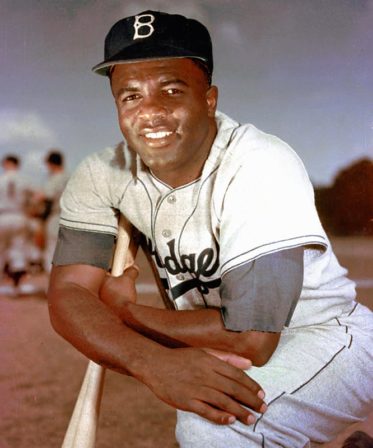The Importance of Jackie Robinson
By
George Mitrovich

April 15, 1947 Jackie Robinson broke baseball’s color barrier and made his major league debut with the Brooklyn Dodgers.
Jack Roosevelt Robinson was born in Cairo, Georgia one-hundred years ago, January 31, 1919.
He would grow up to become the “most important black man in American history.”
That was the view of the late Buck O’Neil, founder of the Negro Leagues Baseball Museum in Kansas City, who often pointed out that before Martin Luther King (MLK) there was Jackie; before Rosa Parks, there was Jackie; before Civil Rights marches in the South, there was Jackie; before Brown versus the Board of Education, there was Jackie; before Thurgood Marshall was nominated for the Supreme Court, there was Jackie, and before President Harry Truman desegregated the military, there was Jackie.
Whether Jackie Robinson was the “most important black man” in our history, as Mr. O’Neil claimed, there’s no disputing his standing in the annals of our country’s tortured history of race.
That standing happened because on April 15, 1947 Jackie broke baseball’s color barrier. He made his major league debut with the Brooklyn Dodgers, as no African-American had ever played for any major league team in the game’s 78-year history – when only the ball was white.
Every April 15 every professional baseball player wears Jackie’s number 42, from the minor leagues to the majors. And that now iconic number is given a place of prominence in every major league ballpark — from Petco to Fenway.
While he was born in Georgia, Jackie grew up in Pasadena, California, where he fell in with a “gang” and became a major concern to his mother.
She spoke to a young Methodist minister and asked him to talk to Jackie, which he did, and that conversation would lead to a friendship, resulting in a profound change in young Jackie, as he would accept Jesus Christ into his life.
That part of Jackie’s story is seldom touched upon by sports writers, mostly because many of them are profoundly ignorant of Christianity; but it is a critical part of Jackie’s life, as Branch Rickey, the general manager of the Dodgers, the man who made the decision to sign Jackie, was a lifelong Methodist, and believed that Jackie’s background as a Christian and Methodist, would enable him to withstand the racial hell he would enter as the first black player in the majors – and it was hell!
This is the 17th year the Boston Red Sox will remember Jackie on his birthday as a pivotal figure in the history of American sports and society – remembered for his accomplishments as a Baseball Hall of Fame player and, no less, for his equally remarkable qualities as a human being.
There is no small irony in the fact that the team commemorating his birthday – and the only major league team to do so on January 31 – is the same team that said no to signing Jackie in 1945.
So why now?
And why the Red Sox?
Why would a team, which didn’t sign its first black player until 1959, 12 years after Jackie broke into the major leagues, why would that team honor him on his birthday 58 years after his bogus tryout?
The answer is found with the Red Sox’s ownership group that took control of the team in 2002, led by principal owner John Henry, chairman Tom Werner, and president Larry Lucchino, as they sought to change the culture of an organization perceived by many as racist.
Aided by the Red Sox’s vice president for public affairs, Dr. Charles Steinberg and his assistant, Sarah McKenna, the ownership team decided they would honor Jackie each year on his birthday. They would do this in the hope that other major league teams would hold similar tributes, but if no other team did – and no other team has – the Red Sox would make their commitment an abiding one.
For a professional sports team to own up to its troubled past where black players are concerned, as the Red Sox have, is a rare occurrence, one that should be widely acknowledged. But few in the media have taken note of the Red Sox’s courageous act – with the notable exception of Howard Bryant, then with the Boston Herald.
At the initial birthday tribute in 2003, before an audience of Boston middle-school children, as well as political and civic leaders, Larry Lucchino announced a bill would be introduced in the United States Congress to secure for Jackie posthumously the Congressional Gold Medal. Lucchino said that John Kerry and John McCain in the Senate, Richard Neal and Peter King in the House, would be the bill’s principal sponsors.
In due course, the legislation passed, and the president signed it, and on March 2, 2005, in the great Rotunda of the United States Capitol, before members of Congress and a standing room only audience, President George W. Bush presented to Rachel Robinson, Jackie’s widow, the Congressional Gold Medal, first given to George Washington.
The Red Sox, by hosting this annual event, seek to remind Americans of the significance of Jackie Robinson; to affirm his place as an individual who changed, not just baseball, but the social and political dynamics of our nation’s life.
The dream lives on.
And my role?
I’m the chairman for the Red Sox of the annual birthday tribute and have been since its inception. And it was Melody Miller of Senator Ted Kennedy’s staff and me, who suggested the Gold Medal for Jackie.
I assisted in the drafting of the legislation, monitored its passage through Congress, until that glorious day when an assistant to the president, called to tell me he had the signed the bill.
But know this, absent the Red Sox, this would never have happened.
___________________________________________________________________
George Mitrovich is a San Diego civic leader. He may be reached at, gmitro35@gmail.com.
Category: Featured Articles, National News







